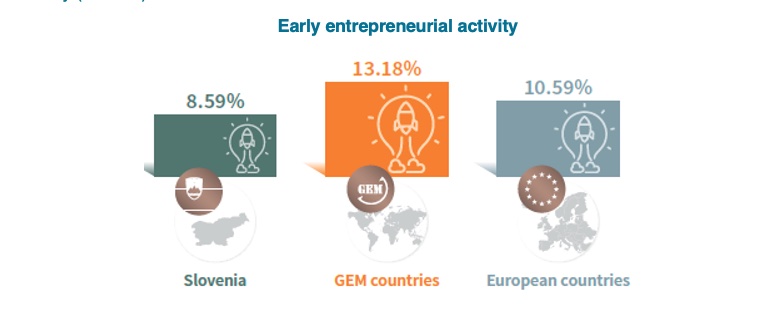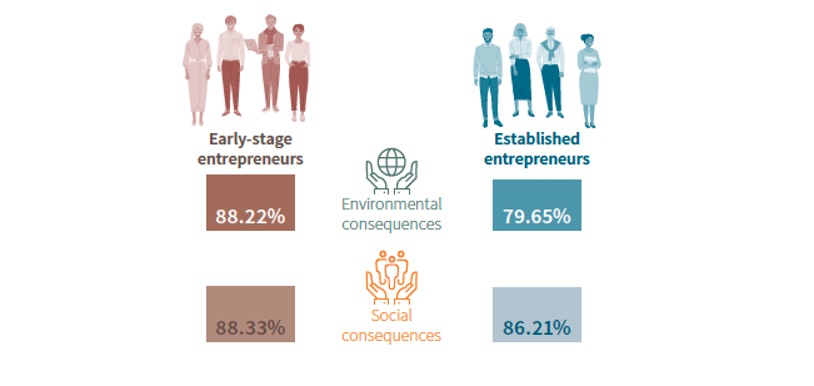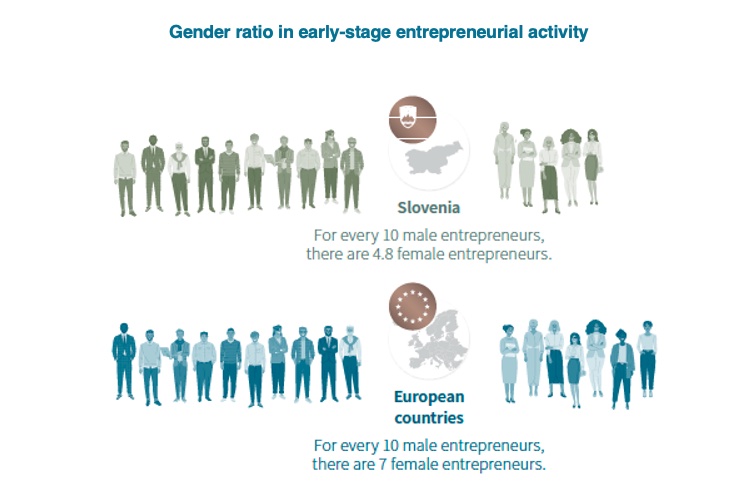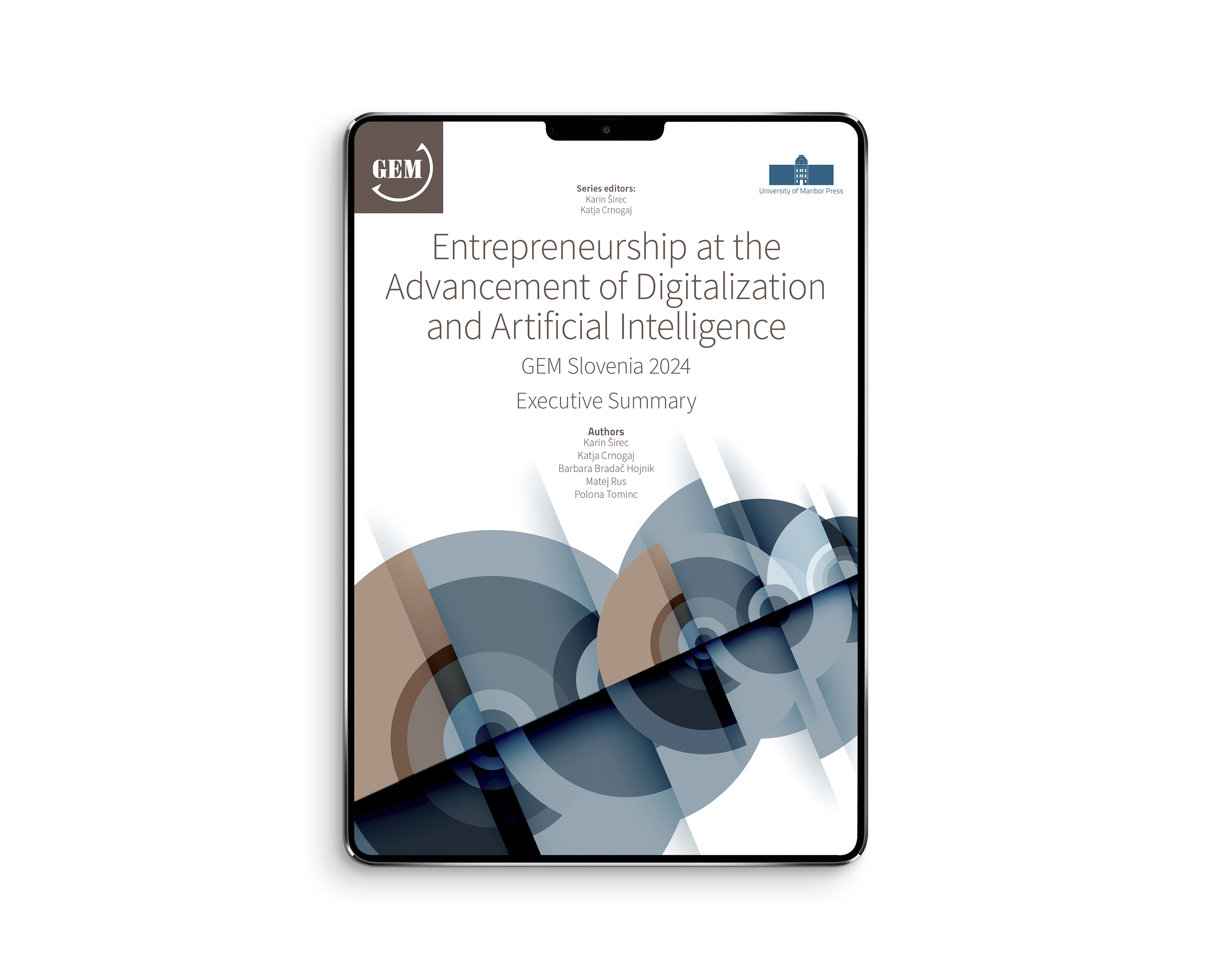Slovenia is recording historically high early entrepreneurial activity, but it is still hampered by administrative barriers, a lack of venture capital, and slow implementation of digital and sustainability strategies.
These are among the findings highlighted in Entrepreneurship at the Breakthrough of Digitalization and Artificial Intelligence: GEM Slovenia 2024, prepared by the research team from the Institute for Entrepreneurship and Small Business Management at the Faculty of Economics and Business, University of Maribor. (Access the Full Report, Executive Summary and Infographics).
Record high early stage entrepreneurial activity, but companies struggle to survive the early stage
The survey provides comprehensive insight into entrepreneurial activity in the era of digital transformation. It focuses on the impact of artificial intelligence and digital tools on the business models, growth and international competitiveness of Slovenian entrepreneurs, while also analysing broader systemic and social factors that influence entrepreneurial dynamics. One of the key indicators of entrepreneurial vitality - Total Early-stage Entrepreneurial Activity (TEA) - reached 8.59% in 2024, the highest value ever in Slovenia. This breakthrough indicates encouraging growth in entrepreneurial momentum, but at the same time reveals that Slovenia still lags behind the European (10.59%) and global averages of the countries included in the GEM survey (13.18%).

Early entrepreneurial activity
The ratio between early-stage and established entrepreneurs also remains weak – in the EU it is 1.54, but in Slovenia it is only 0.99, which indicates that many new companies do not make it to the stable business phase.
Prof. Dr. Karin Širec, head of the GEM Slovenia research, explains: "Early entrepreneurial activity in Slovenia is growing, but the transition to entrepreneurial growth remains a challenge - mainly due to difficulties in financing and administrative obstacles. Despite the stability of established companies, the ecosystem needs more incentives for innovation. At the same time, demographic differences persist, especially in the inclusion of women, young people and the transfer of businesses between generations. With targeted measures in the field of digital transformation, sustainable strategies and the inclusion of different demographic groups, Slovenia can increase competitiveness and create a dynamic and inclusive entrepreneurial environment."
At the same time, 56% of Slovenian adults today recognize business opportunities in their environment – a significant increase compared to 35% five years ago. However, optimism is often hampered by the fear of failure, which remains among the highest in Europe for 46% of the population. This gap between perceived opportunities and actual entrepreneurial activity also reflects the lack of access to venture capital and the slow removal of systemic barriers. This is where digitalization and artificial intelligence offer an opportunity – but also hold up a mirror to the entrepreneurial environment and the political will for change.
Artificial intelligence as a tool, not yet a revolution
Slovenian entrepreneurs perceive artificial intelligence (AI) as an important driver of efficiency and innovation. As many as 27.24% of early entrepreneurs believe that AI will play a key role in the next three years, which exceeds the European average (22.58%). The results show that Slovenian entrepreneurs recognize AI primarily as a tool for improving business efficiency, while they are less convinced about its impact on innovation, growth and risk management. At the same time, they express more concerns about data security, but fewer reservations about costs and implementation compared to other European countries.

Additional context to the perceived barriers to AI implementation is provided by national experts at GEM NES, who point out that Slovenia has not yet developed an appropriate regulatory framework for testing and implementing advanced AI solutions. As a result, many development projects are moving abroad, where the supporting environment is better adapted to rapid technological progress.
Prof. Dr. Polona Tominc, co-author of the research, points out: "Despite the improvement in the perception of entrepreneurial opportunities and the increasing use of artificial intelligence, entrepreneurship in Slovenia still faces certain challenges that hinder its full potential. Key obstacles remain the fear of failure, economic uncertainty, and concerns about the ethics and safety of using AI. To overcome these obstacles, it will be necessary to strengthen entrepreneurial education and support for young entrepreneurs, and improve the understanding of digital opportunities."
Digital tools – strong presence, but not yet fully exploited potential
Slovenian early entrepreneurs use digital tools to implement business strategy above average - especially cloud services (57.8%) and data analytics (56.3%), which reflects the good digital orientation of Slovenian entrepreneurs and their willingness to use advanced technological solutions.
Digital tools for implementing the business model of early entrepreneurs
Although Slovenian early entrepreneurs actively use digital tools, data shows that the importance of digital communication channels decreases somewhat as the company grows. For many established companies, these channels remain only a supplement, not a strategic pillar of marketing and sales. This suggests that digital transformation is often not holistic, but limited to tools for internal efficiency, and less to channels for growth and access to customers.
Innovation for global markets, sustainability for the future
The small domestic market forces Slovenian entrepreneurs to internationalize. As many as 46.68% of companies generate revenue in foreign markets – well above the European average (38.30%). The most successful in this regard are digitally supported business models focused on services with high added value. It is encouraging that more and more Slovenian companies offer an example of the successful integration of market orientation, internationalization and innovation. Companies that manage to balance these elements secure competitive advantages, direct the transformation of industries and ensure long-term growth.
Mag. Matej Rus, co-author of the research, adds: "Slovenia is among the countries where entrepreneurs often see their work as a contribution to social change, but the entrepreneurial ecosystem still lags behind the most innovative countries. The rapid implementation of the Slovenian Startup Strategy will be key - with a lean company, startup visa, stock options, tax incentives and a strong supportive environment. Special emphasis must be placed on advanced technologies, digital services and internationalization, where companies show the greatest global potential."
The GEM survey also showed that Slovenian entrepreneurs demonstrate high sustainability awareness – as many as 88.33% of early and 86.21% of established entrepreneurs consciously consider social impacts in their business decisions, while 88.22% and 79.65% of environmental impacts are taken into account. However, only 27.05% of early and 34.99% of established entrepreneurs implement concrete sustainable measures to increase social impact, with Slovenia achieving one of the lowest values in Europe. The picture improves slightly in environmental measures (37.83% of early; 43.37% of established), but Slovenia still occupies an unenviable last place among the European GEM countries.

Entrepreneur profile and success factors
The profile of Slovenian entrepreneurs shows a broad representation of different age groups, with the highest level of early entrepreneurial activity recorded among individuals aged 25 to 34, while the largest number of stable, established companies are run by individuals between the ages of 45 and 54. Most early entrepreneurs have a college or university degree, and 60% of them fall into the upper third of the income bracket. For established entrepreneurs, this percentage rises to 69%. The financial effects of entrepreneurship therefore materialize only after several years of operation, which can discourage younger talents without a safety net. The common challenge remains how to shorten the time from startup to growth (time ‑to scale) and ensure equal access to finance, market and knowledge for all demographic groups.
The gender gap is closing too slowly, but despite numerous initiatives, the gap between female and male entrepreneurs remains more than five percentage points.

In terms of motivational profile, almost half (49.9%) of Slovenian early entrepreneurs cite “creating social change” as a key driver, while the share of those entering entrepreneurship due to a lack of employment alternatives is 51.1% – nine points below the European average.
Ecosystem support – time for a breakthrough
Slovenia ranks below the European average in the National Entrepreneurial Context Index (NECI) with a score of 4.1 (on a scale of 0 to 10). Despite good physical infrastructure and a dynamic internal market, key obstacles remain excessive bureaucracy, unpredictable legislation and limited access to finance, which make it difficult for entrepreneurs to move from the initial stages to stable growth and international competitiveness. At the same time, Slovenia needs to strengthen investment in digital skills and enable a faster transfer of innovations from the research sector to the economy, as systemic weaknesses currently hinder the development of new technologies and business models. Swift and decisive action will be needed to ensure that Slovenia does not continue to lose innovative companies and talents seeking opportunities in more competitive business environments.
About the Global Enterpreneurship Monitor
The Global Entrepreneurship Monitor (GEM) is the largest and most advanced entrepreneurship research program in the world. It was launched in 1999 by Babson College and London Business School , and Slovenia joined the research in 2002. GEM is unique primarily because, unlike other databases that measure the characteristics of smaller and new businesses, it studies the behavior of individuals in the process of creating and managing a business. It studies the early stages of entrepreneurial activity, established businesses and factors that influence the birth of new businesses, and seeks answers to questions such as how entrepreneurial Slovenia is, where we rank in the world in the field of entrepreneurship, and how entrepreneurship could be accelerated.
The Slovenian part of the research is led by the Institute for Entrepreneurship and Management of Small Businesses at the Faculty of Economics and Business, University of Maribor , which, together with researchers from national teams from other countries, also actively co-creates the further development of the content and methodology of the research. The Slovenian research team consists of Prof. Dr. Karin Širec (leader), Prof. Dr. Polona Tominc, Prof. Dr. Katja Crnogaj, Prof. Dr. Barbara Bradač Hojnik, Mag. Matej Rus and Honorary Prof. Dr. Miroslav Rebernik.
The GEM 2024 survey was sponsored by Cartier Women's Initiative , Ministry of Industry and Tourism , Spain (ENISA), SPRI Group ( Basque Government ), Government of Bizkaia , Bilbao City Council , Observatorio del Emprendimiento de España (OEE), Basque Entrepreneurship Observatory (BEO), University of the Basque Country (UPV/EHU), University of Deusto , Mondragon University and the national GEM teams. The Slovenian part of the research is funded by SPIRIT - the Public Agency of the Republic of Slovenia for the Promotion of Investment, Entrepreneurship and Internationalization , the Ministry of the Economy, Tourism and Sports and the Public Agency for Scientific Research and Innovation of the Republic of Slovenia under the research program P5-0023 and the Institute for Entrepreneurship and Small Business Management at the Faculty of Economics and Business, University of Maribor.
Detailed research results are available on the website of the Institute for Entrepreneurship and Small Business Management: http://ipmmp.um.si/ and on the global website www.gemconsortium.org , where you can also find the results of entrepreneurship research in previous years, databases and numerous other information about the global research.
At the same time as the Slovenian edition of the Global Entrepreneurship Monitor 2024, an extensive summary of the research in English was also published for the international scientific and professional public.
Access the Full Report, Executive Summary and Infographics.
Additional information:
Prof. Dr. Karin Širec
Faculty of Economics and Business, University of Maribor
Institute for Entrepreneurship and Small Business Management
Contact: karin.sirec@um.si

